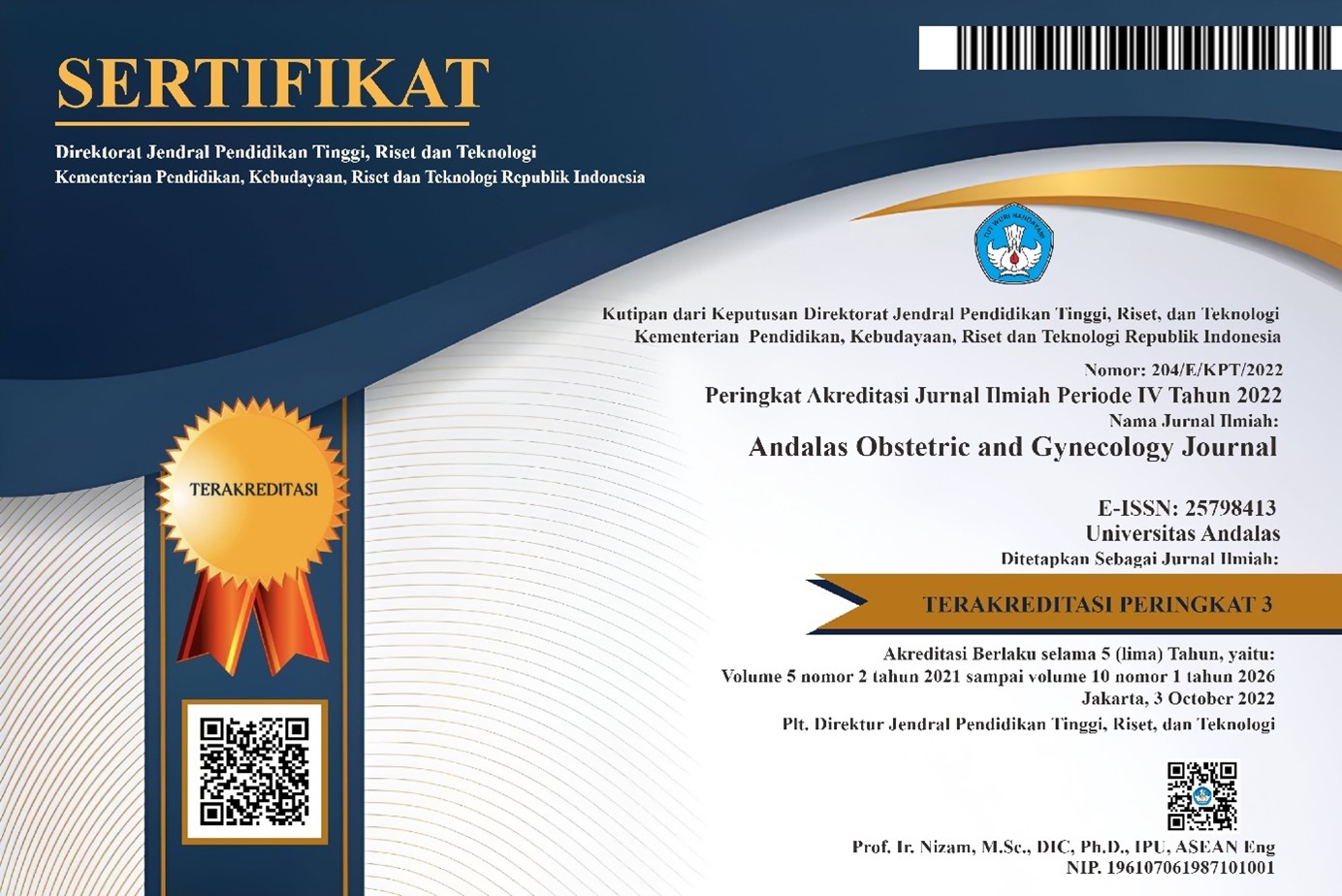How far is Covid-19 Pandemic Situation Influence Surgical Treatment in Gynecology Cancer? : Comprehensive Review for Indonesian
DOI:
https://doi.org/10.25077/aoj.4.2.203-217.2020Abstract
Corona virus disease 2019 (COVID-19) was declared as global pandemic and caused devastating crisis in society. Despite of the growing pandemic, high quality medical services toward gynaecologic oncology patients must continue without overlooking the safety of medical staffs. Reducing risk is crucial and achieved by limiting high risk situations. The decision to perform or postpone surgery should be made based on the type and stage of the disease, medical condition of the patient, area census of COVID-19 cases, COVID-associated risks, and available logistic support including adjuvant treatment services. There are several recommendation for gynaecology cancer treatment published by several countries. However, those guidelines cannot be applied to every country across the globe because of the different situations of COVID-19 therefore we proposed guidelines for Indonesia. Surgical management for confiermed COVID-19 case should be postponed for at least 15 days for nonemergency cases. Surgery must be performed immediately for emergency cases such as Haemorrhage with unstable vital status refractory to transfusion, viscus perforation, signs of bowel obstruction refractory to conservative treatment, closed loop bowel or large bowel obstruction, hydatiform mole for live saving procedure. Â
Keywords: COVID-19, gynaecology cancer, surgical managementReferences
Jubilee Brown. Surgical Decision Making in The Era of COVID-19: A New Set of Rules.
Groupe FRANCOGYN (Groupe de Recherche en Chirurgie Oncologique et Gynecologique). 2020. Recomendations for The Surgical Management of Gynecoogical Cancer during COVID-19 Pandemic: Guideline for Clinical Practice. Elsevier. Journal of Gynecology Obstetrics and Human Reproduction 49.
B.J. Monk, R.L. Coleman, K.N. Moore, et al. 2020. COVID-19 and ovarian cancer: Exploring alternatives to intravenous (IV) therapies. Gynecologic Oncolog
Ramirez PT, Chiva L, Eriksson A, Frumovitz, et al. 2020. COVID-19 Global Pandemic: Options for Management og Gynecologic Cancers. International Journal of Gynecological Cancer. Editorial. Published: March 28th 2020.
Sun-Jong Lee, Taechun Kim, Miseon Kim, Yong-Bae Kim, et al. 2020. Recommendations for gynecologic cancer care during the COVID-19 pandemic. Division of Gynecologic Oncology, Ewha Womans University Cancer Center for Women, Ewha Womans University Mokdong Hospital, College of Medicine Ewha Womans University
Yusuko Kobayashi, Dong Hoon Suh, Daisuke Aoki, Jae-Weon Kim. 2020. Management of ovarian cancer patients in affected areas during COVID-19 pandemic: Japan and Korea. J Gynecol Oncol. 2020 May;31(3):e65
World Health Organization (WHO). 2020. Coronavirus disease (COVID-19): Situation Report-146. Updated at June 14th 2020.
Sebastianelli A, Plante M, Langlais E, Salvador S, et al. 2020. GOC Position Statement for The COVID-19 Pandemic Situation: Treatment and Management for Women with Gynecologic Cancer. Gynecology Oncologist Cociety of Canada.
American College of Surgeons. 2020. COVID-19: Elective Case Triage Guidlines for Surgical Care: Gynecology.
Bhatla Neerja, Singhal Seema. 2020. Association og Gynecologic Oncologist of India. Indian Journal of Gynecologic Oncology. 18:48.
Downloads
Published
Issue
Section
License
Copyright (c) 2020 JOURNAL OBGIN EMAS

This work is licensed under a Creative Commons Attribution 4.0 International License.
Copyright
Authors who publish with this journal agree to the following terms:
- Authors retain the copyright of published articles and grant the journal right of first publication with the work simultaneously licensed under a Creative Commons Attribution 4.0 International License that allows others to share the work with an acknowledgment of the work's authorship and initial publication in this journal.
- Authors are able to enter into separate, additional contractual arrangements for the non-exclusive distribution of the journal's published version of the work (e.g., post it to an institutional repository or publish it in a book), with an acknowledgment of its initial publication in this journal.
- Authors are permitted and encouraged to post their work online (e.g., in institutional repositories or on their website) prior to and during the submission process, as it can lead to productive exchanges, as well as earlier and greater citation of published work (See The Effect of Open Access).
License:
Andalas Obstetrics and Gynecology Journal (AOJ) is published under the terms of the Creative Commons Attribution 4.0 International License. This license permits anyone to copy and redistribute this material in any form or format, compose, modify, and make derivatives of this material for any purpose, including commercial purposes, as long as they credit the author for the original work.







